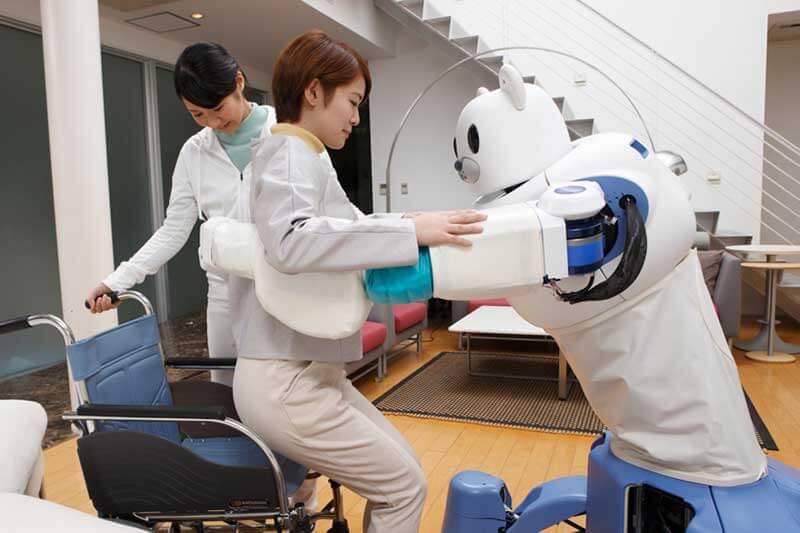- We get more time to exploit our qualities
- Big data in the smart city
- Get used to the idea that data is not exclusively your property
- Far-reaching implications for society
- Companies are becoming smaller in order to maneuver faster
- Why not set up test platforms and just do it!
Technological developments happen so rapidly that even trendwatcher Richard van Hooijdonk is somewhat reluctant to make predictions beyond one year. What is now made possible by ICT transcends the improvement of existing processes and production methods. It allows complete, time-tested business models to crash, making room for genuine innovation. Van Hooijdonk talks about the main trends and about what businesses and organizations need in order to survive in this fast changing world.
One of the trends which will have significant impact is the robotization. “Robots and machines of the future will increasingly replace people’s tasks,” Van Hooijdonk says. “And I’m not just referring to assembly line jobs. We will soon find them in stores and we will not be surprised at all to see them standing at a hospital patient’s bedside; a friendly-looking, even pleasant-smelling android looking at you. It will record how you feel and what you need. It will receive data from the electronic pill you swallowed, which records and monitors your body’s core functions. There is more and more communication between systems and they are able to adequately respond to each other. Imagine such an electronic pill being connected to your GP’s computer. You will no longer have to sit in the waiting room with health problems; the doctor will have called you before you even developed these symptoms. Sounds incredible, doesn’t it? But there are also drawbacks to connecting all kinds of devices and systems, because as soon as you have another couple of beers too many, a message might just be automatically sent to your health insurance provider, who will then have reason to increase your premium.”

We get more time to exploit our qualities
Linking a variety of devices and systems is also referred to as ‘the internet of things’. Something you do will be detected and communicated to another device, which will in turn anticipate your next action. Let’s assume you have an appointment at the municipal office: As you approach the building, you are registered. At the door, you are welcomed and, because your reason for visiting is known, you receive directions on your smartphone – taking you to the right department where the beverage you were so looking forward to, is already waiting for you.
“Actually, we already use devices that facilitate this. Almost every person owns a Smartphone and as soon as Apple Watch starts looking decent, these people will embrace that as well. Apple Watch contains many sensors that measure all kinds of things, such as your heart rate and your energy usage. Connecting devices in a smart way will enable us, people, to spend less time on simple tasks. Think of the milk carton in your refrigerator; actions such as monitoring its contents and making sure it’s replenished can easily be taken over by a device. People are not destined to perform such basic tasks and thanks to the current technological developments we are given more opportunities to use our actual abilities.”
Big data in the smart city
Enriching ‘the internet of things’ with Big Data will open up even more possibilities. Van Hooijdonk mentions the example of ‘the smart city‘.
“We use more and more devices that, when combined, produce an enormous amount of data. This data can be used to make things run more smoothly. Let’s say heavy rains are predicted. You could then, based on historical data, also predict that more people will be using public transportation. And that information can be used to estimate how many extra buses will have to be used and to make sure they are provided on time. And if the weather is nice, you can have benches ‘pop up’ automatically. Of course these will automatically disappear again during rush hour, because they will signal that more space is needed for the high volumes of commuters. While saying this, I am imagining a machine sucking up polluted air during periods of heavy traffic, and that same machine extracting water from the air during quieter times. We will be seeing many improvements that help make life in the city more pleasant.”
Get used to the idea that data is not exclusively your property
Van Hooijdonk doesn’t deny that there are dangers and disadvantages to the current developments. “Get used to the idea that the data you produce is not necessarily secure and not necessarily your property. To some extent that isn’t necessarily a problem but I do suggest that you implement a personal, digital safe for securing the important data you generate. You should be able to determine which information gets sent to your insurance company, which data can be sent to the Receiver of Revenue, what your spouse is allowed to see and which information should stay hidden completely. Think of it as a ‘personal guardian’. As far as I understand, the Land Register in the Netherlands is already talking about this with the notary. I think these parties have responsibilities there.”
However, according to our trend watcher, unauthorized use of our personal data by companies or government departments shouldn’t be our main concern. “Our systems are more fragile than we think and there are incredibly smart hackers in countries like Russia, Iraq and Iran are who are willing to work for four hundred Euros per month. There lies the greatest danger.”

Far-reaching implications for society
Technology enables changes that can make existing business models crash and allow new ones to take shape. “Everything is going to change. We are in the middle of the third industrial revolution. Think of how Internet and applications such as Spotify have completely turned the music industry upside down. Also, look at how initiatives such as Airbnb and Uber have impacted us. Think beyond and look at the possibilities of the 3D or even 4D even the printer. When a part of your car breaks you will no longer have to order it from a faraway country where it is mass-produced at a manufacturing plant. Instead it will be like this: “No problem at all, we will gladly print the part for you”. The impact these new possibilities will have on our society should not be underestimated. I expect that we will end up with much less manpower while achieving a much higher GNP. Everything will be faster, more efficient and require less manpower. With the added result that there also won’t be any jobs for lower-skilled people – which is a large group, possibly a quarter of the European population. They will have to give up their place in the work force and this sacrifice will have to be compensated. The wealth created by the new business models will have to be shared with this group of people such as, for instance, by introducing a standard basic income for each citizen.”
Companies are becoming smaller in order to maneuver faster
“Individuals need less time to adopt new technologies and possibilities than organizations and companies. Today I travel by train, tomorrow I might prefer Uber and the day after there might be a new app that I’ll think is worth trying out. Increased flexibility is important for companies and organizations. Responding and moving quickly is vitally important which is why everything is becoming smaller. If you own a company with a thousand employees, divide it into ten businesses of a hundred. And then into units of ten. Only small groups can be maneuvered quickly. The government has another problem. They don’t have the DNA of innovation. In order to learn, they would be well advised to work closely with innovative companies such as Google and Amazon. All the old systems will crash, creating an entirely new world. Incredibly scary perhaps, but there’s no stopping it. The government should become passionate about innovation. It needs to embrace the desire to explore it instead of clamping down on it with more and more rules, laws and regulations. What we hear is either: ‘we don’t want it’, or: ‘we are unable to do it’ or: ‘we are not allowed to do it’. That is very disappointing to me.”
Why not set up test platforms and just do it!
In terms of all these developments, what could companies and government departments actually do? “Set up test platforms with people from different companies, government and education departments and get started. Contemplate how you can improve customer service by using robot technology and Big Data. Do it, try it out. And remember, in a test environment you are allowed to color over the lines. Choose a few government departments, put an imaginary fence around them and give people the freedom to genuinely innovate.”
Share via:


